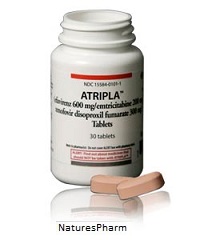What is Atripla?
Atripla (Efavirenz) is a potential HIV and AIDS treatment that produces a complex effect. Containing Emtricitabine, Efavirenz and Tenofovir as active ingredients, the drug helps to prevent the reproduction process of human immunodeficiency virus in the body. Despite Atripla cannot cure the conditions, it is sufficient to improve their symptoms and prevent from further aggravation. The medication is aimed at treatment of HIV that can further lead to the development of acquired immunodeficiency syndrome. Having a powerful impact on the organism and its vital functions, the drug should never be given to children under 12 years old.
Striving to get the advantageous Atripla effect and witness no complications, one should follow the doctor’s prescription without any changes. Increasing or decreasing the recommended dose you increase the risk of side effects occurrence, activated by the drug misuse. Atripla should be used on an empty stomach in the evening, before bedtime. Frequent blood tests may be required during Atripla treatment course to track the success of the medication use. Ask your doctor about other disturbing issues.
Do not take Atripla if your doctor does not recommend you. The side effects may be stronger than effect produced, thus, take Atripla only if you are qualified for its safe intake. Do not take the treatment if you are allergic to any of its active ingredients, such as Emtricitabine, Tenofovir, Efavirenz. Besides, to make sure the drug is effective and not dangerous in your case, inform your healthcare provider about other conditions and illnesses you have, especially: Low bone mineral density,Epilepsy,Seizures,Serious kidney or liver disorders,Psychical diseases, depression, anxiety, agitation,Hepatitis B or C, etc.
Atripla is the drug that has a severe impact on kidneys functioning and can harm them. Definite medications can aggravate the situation and make the condition worse. That is why, it is essential to inform your doctor about all the pharmaceutical products you use before Atripla treatment course. The HIV treatment interacts with the following drugs:
Never increase or double Atripla dose to avoid the drug overuse. Follow the prescribed adjustments to eliminate the risk of side effects occurrence. Seek immediate medical help if you have noticed the signs of Atripla overdose, such as breathing disorders, hives, itching, swelling, etc. Additionally, inform your doctor about minor complications, including rashes, insomnia, nausea, vomiting, dizziness, drowsiness, fatigue and concentration problems that become worse.
Call the healthcare specialist and stop Atripla administration in case you experience severe side effects after its use, especially:
Recommendations for Use
Precautions and Contraindications
Drug Interactions
• Injected antibiotics;
• Arthritis treatments;
• Narcotic pain drugs;
• Chemotherapy;
• Antiviral medications;
• Antidepressants, such as Wellbutrin, Zoloft and others;
• Other HIV drugs, especially Didanosine, Saquinavir, Indinavir, Maraviroc;
• Organ transplant rejection treatments, including Tacrolimus, Cyclosporine, Sirolimus;
• High cholesterol medications;
• Seizure drugs;
• Blood pressure treatments and others.
Since it is not a complete list of drugs that should not be combined with Atripla, warn your doctor about other prescription and generic treatments you use.
Side Effects
• Symptoms of lactic acidosis: muscle weakness, breathing problems, fast heartbeat, uneven heart rate, nausea, vomiting, general weakness and others;
• Sudden mood or behavior changes, depression, irritation, anxiety, agitation;
• Hallucinations, suicidal thoughts;
• Convulsions;
• Serious skin reactions;
• Liver or kidney problems;
• Sexual dysfunction, low libido, menstrual changes and others.


